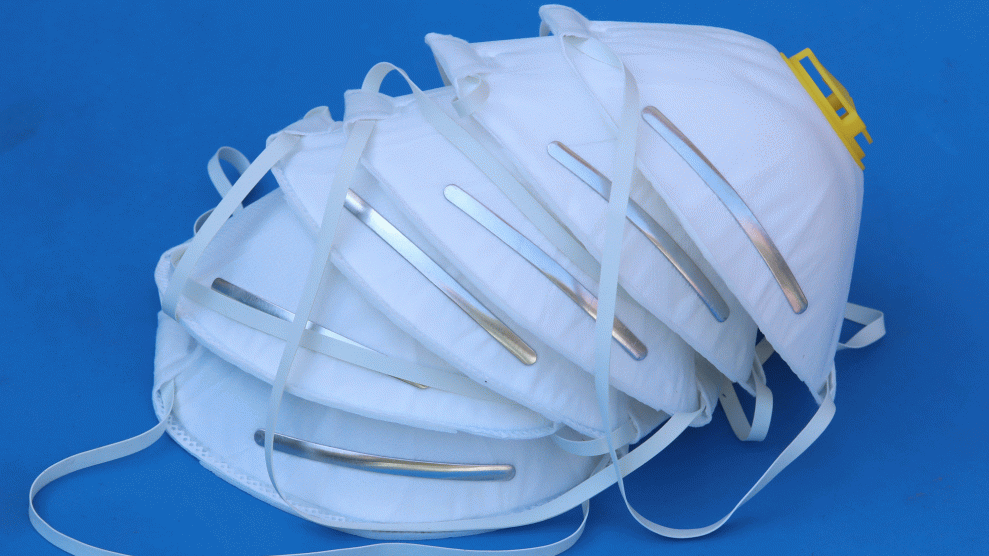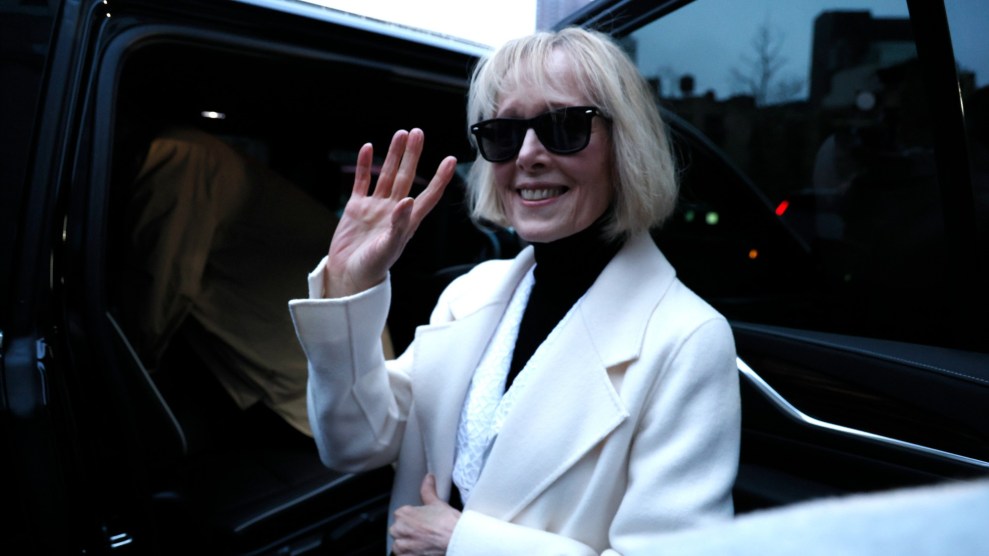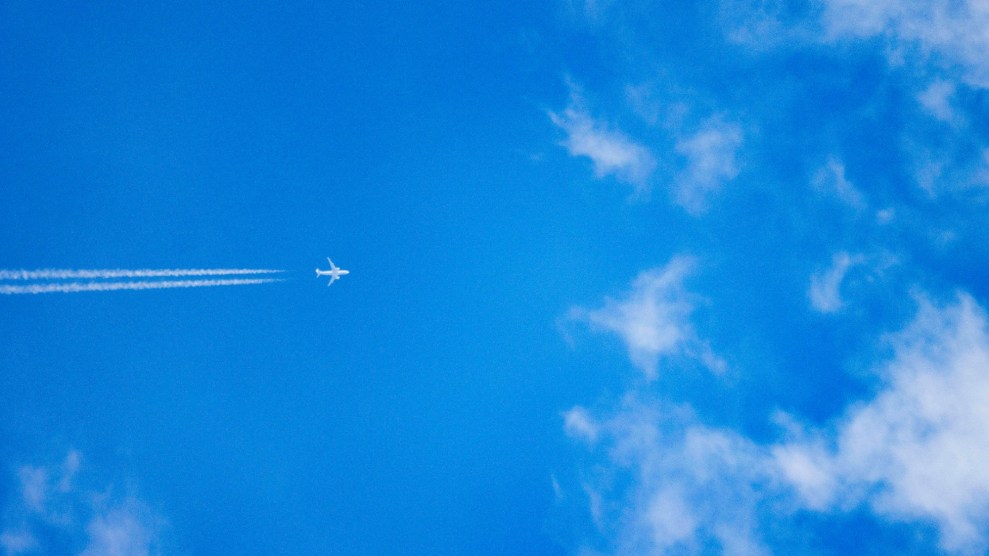
Pierre Teyssot/Zuma
A few weeks ago, freelance photographer Ning Mosberger-Tang was running her foundation in Boulder, Colorado, which funds environmental issues. Now she has become a reluctant expert on the importing of personal protective equipment from China. Her experience illustrates the challenges that states and hospitals have faced in obtaining PPE—masks, gowns, and the rest—but also demonstrates that this is not an impossible task and that the Trump administration has failed miserably in this mission.
As the coronavirus pandemic intensified in March and a severe nationwide PPE shortage was exposed, Mosberger-Tang, who had several friends who were health care workers dealing with the crisis, held a small fundraiser and pulled in enough money to buy a few thousand face masks to donate locally. “I could see that was not enough,” she recalls. “We needed to scale up and had to go to China to get PPE at wholesale and then donate or sell it at cost.”
But she had no previous experience in procuring medical equipment from abroad. She had grown up in China and attended graduate school at the University of Arizona before joining Google as a software developer in 2001. She left the tech firm five years later and began working with her Innovo Foundation, which annually hands out several hundred thousand dollars in grants. But Mosberger-Tang, 48, remained plugged into the Google network, and in early April she was able to raise $1.6 million, mostly from other Google veterans, for an effort to purchase PPE in China, which is where most of these products are manufactured. Then she had to figure out how to do this.
The rush to find PPE has been chaotic. States have been competing with other states to locate and buy the stuff. Hospital systems have been scrambling on their own. Profiteers and scammers have been exploiting the high demand. In one instance, an Illinois state official handed off a $3.5 million check in a McDonald’s parking lot as part of a deal to procure a PPE shipment. And the federal government has been intercepting PPE shipments heading toward states and hospitals, claiming them for the national stockpile.
As Mosberger-Tang started to make contacts and reach out to potential suppliers, she found herself in a wild and woolly world. One Chinese source said he could supply her 1,000 ventilators. But she didn’t trust him. Other sources were charging two to three times the already inflated going rates for PPE. But she had an advantage: a family friend who was a businessman living in Zhejiang province in southeastern China. She trusted him completely. Her friend worked in the hotel business and was involved in other enterprises, but he quickly cultivated contacts with manufacturers in different Chinese provinces, targeting firms that had long track records but had not yet done much exporting to the United States. He was able to visit factories and check on the products. “He has had to move very fast to get deals done,” she says.
Even so, this was not an easy job for him. “The Chinese government is not eager to get supplies to the United States,” Mosberger-Tang says. “They are more friendly to Western Europe, and they have been pairing manufacturing in particular provinces with Western European countries.” Representing an American buyer was a disadvantage.
In one instance, she notes, the nonprofit she formed for this project—dubbed Step Up in Crisis—had ordered 2 million surgical masks from a plant in Jilin province in northern China. Then she heard that the masks were being impounded by a local provincial official to be sent to Europe. Her friend immediately flew to Jilin and managed to keep control of the shipment.
There are other barriers for Americans seeking PPE in China. “The Chinese government is making it more difficult,” Mosberger-Tang says. “Importers in the United States have to sign a number of contracts to get supplies through customs. And Chinese manufacturers are afraid they will be sued by Trump [if anything goes wrong with the use of their products]. They ask US importers to sign liability waivers, and the Chinese regulations on this keep changing. Under a new regulation issued last weekend, the importer and the exporter must sign a joint declaration that some of these goods are for non-medical use only. So the importer will sign. Then if it’s released to a non-profit, the non-profit will have to sign a waiver. There’s a whole chain reaction.”
With the $1.6 million, Step Up in Crisis, according to Mosberger-Tang, was able to purchase from different Chinese factories the 2 million surgical masks, 20,000 protective suits, 20,000 surgical suits, 8,000 shoe covers, and 200,000 KN95 masks. (These masks are similar to N95 masks routinely used in hospitals, and the Food and Drug Administration now allows KN95 masks to be used in medical situations.) The prices were good: $1.20 for each KN95 mask, 35 cents for each surgical mask, $5.40 for a surgical gown. Flexport.org, a shipping outfit that works with humanitarian and nonprofit groups, raised funds to cover shipping costs. Assist International, a global humanitarian organization founded in 1990, has provided Mosberger-Tang crucial organizing help.
In late April, the first shipment of PPE obtained by Step Up in Crisis—50,000 of the surgical masks and the shoe covers—reached a warehouse in Los Angeles. The rest of the supplies are scheduled to arrive in different shipments through the first three weeks of May. The group has a team of Google volunteers who have been scouring a list of 3,000 hospitals and health care facilities to prioritize which institutions should receive this equipment. Step Up in Crisis is looking to sell the PPE at its cost to hospitals that can afford to buy the supplies, but it also intends to donate some equipment to facilities that are financially strapped.
“I have never done anything like this before,” Mosberger-Tang says. “I never imagined doing this before. But the federal government is not doing what it is supposed to be doing. It should be coordinating procurement and distribution. It should be negotiating with China and bringing the PPE over. I have spoken to dozens of local organizations trying to do what we’re doing.”
Mosberger-Tang’s effort shows that desperately needed PPE can be quickly secured from Chinese manufacturers. But one part of the process makes it tougher for government officials and hospitals to pull off these deals: Chinese manufacturers are demanding to be paid upfront. That entails risks that many state governments and health care companies are not able to—or permitted to—absorb. In the deals her group has struck, it has had to pay 30 percent of the total price to reserve the manufacturing time needed to produce the goods. Then the rest of the money has to be sent to the Chinese firm before the PPE is shipped. (The products are inspected either in person or by video before this final payment is made.)
“We take the risk,” Mosberger-Tang says. “We do the risk mitigation. This is not the normal procedure for hospitals and state governments. And it’s a fair bit of risk.”
She hopes to raise more money and use the revenues from the first disbursements to finance additional purchases.
Mosberger-Tang, an American citizen, points out that the current anti-China talk from Donald Trump and his political allies does not help on this front: “I wish the US government could be smarter in dealing with China. They know this manufacturing is in China. There is no point to calling this the ‘Chinese virus’ and irritate the Chinese government and end up not getting the equipment you need.” Moreover, she says, this reliance on Chinese manufacturing must change: “We have to start manufacturing more of this PPE here in the United States. We cannot rely on a foreign county. This will happen again. Manufacturing N95 masks is not rocket science. We have to prepare for the next crisis. We cannot be dependent on a foreign government with all this geopolitical tension.”
“I don’t want to be doing this,” she adds. “I can’t sleep. I have to be working between midnight and 3 a.m. But there’s no choice. We need a federal response. The US government has much more negotiating power than we do. It’s crazy we have to do this.”















